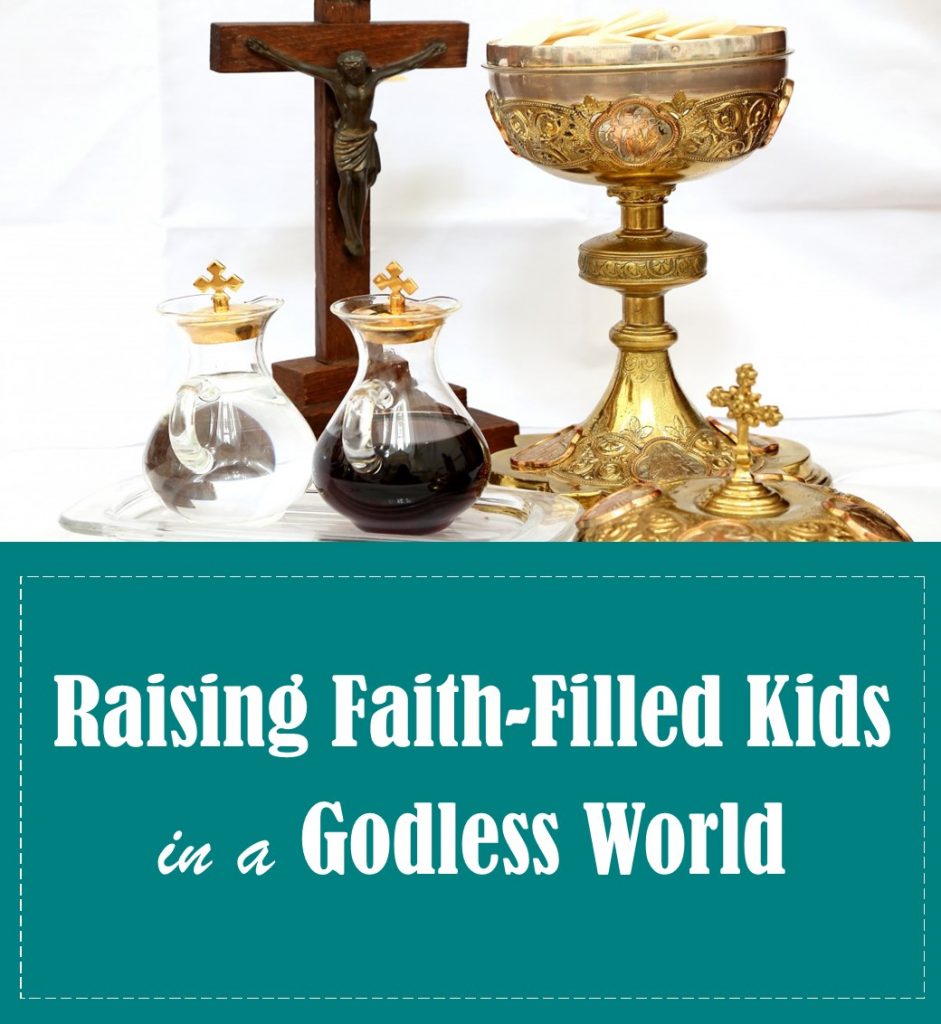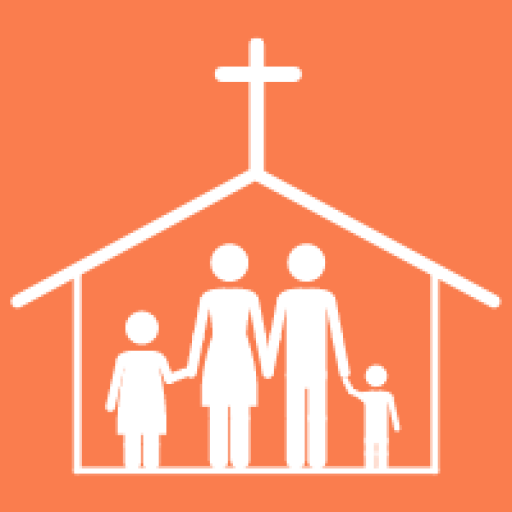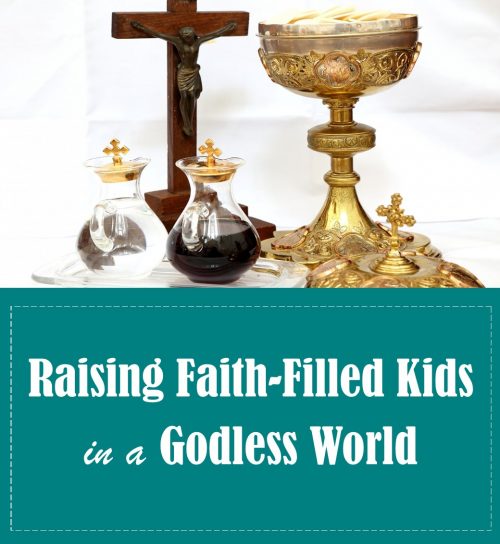
Secularism is one of the big obstacles Catholics parents will need to scale if they hope to pass on the Catholic Faith to a child in the 21st century. In fact, it’s one of the obstacles any parent will need to scale if they want a child to live in reality.
I recently read David Bonagura’s Steadfast in Faith: Catholicism and the Challenges of Secularism. Bonagura wrote the book for teens and young adults, but he is so clearly presents the problem of secularism that I think any adult would benefit from reading it. He not only clarifies the primary problems with the secularist worldview, but he offers reasons why we should hold fast to the Faith despite the aggressive secularization of the society around us. God is real, and God is the answer to every human longing.
So, what is secularism? Why should Catholic parents care? In chapter 2 of the book, Bonagura sets out the main components of secularism. Here I’d like to explore a few of these components and how they compare to a Catholic worldview.
Individualism
Individualism begins with the assumption that the individual is the “ultimate arbiter of his or own existence, behavior, or decisions” (Bonagura 22). We know that expressing one’s individuality is not a problem, as long as this is done with respect for others and in a way that reflects truth, goodness, and reality. After all, part of the task of becoming a mature Christian is to discover how we can use our unique gifts and talents to glorify God in the world.
However, this is not what individualism means in the secularized worldview. It means I should be free to do what I want and define who I am, and if your views or your actions conflict with mine or get in my way, then you are wrong. From this perspective, I am released from personal responsibility: I’m not responsible for any consequences that result from my choices, and I am not responsible for the well-being of anybody else. When personal whims and feelings dictate what is ethical in my world, I will find myself living alone in a me-sized box, where ultimately I will fail to discover the truth about who I am and what I’m meant for.
Individualism makes many evils sound rational, but only on the surface. When you pull back the curtain you discover how empty the arguments, and the damage that would result if you carry the arguments to their logical conclusions. The integrity and dignity of others, including the most innocent, is an irrelevant consideration.
Catholic social teaching is in direct conflict with individualism. The Church is not against the individual! It affirms the value of each individual because we are each made in the image and likeness of God. However, it sees the darkness lurking behind radical individualism, especially its concept of freedom and its tendency to lead one away from Truth instead of toward it.
The Catholic worldview understands freedom “as directed toward the fulfillment of goals established by God through creation” (Bonagura 24). Our purpose in this life is not to amuse ourselves, but to find our way to heaven where we will experience perpetual beatitude. God gives us what we need to get there, especially the many graces we receive in the sacraments of the Church. He also gives us the companionship of other Christians: We know that God did not mean for us to find him alone. The road to heaven is populated with people for a reason. Other people, even the annoying, difficult people, reveal clues about God to us: who he is and where he wants us to go. Our private growth in spirituality is part of living the Good Life, but we will never find God alone. We also need our brothers and sisters, and the guidance of the universal Church.
Relativism
Radical individualism often leads to a relativistic worldview. Relativism is so dominant in western society that we hardly notice it anymore. It assumes there are no moral standards that apply to everyone. We are free to define reality and truth for ourselves because these are mere constructs of culture. The Good (the right thing to do) is anything that makes me feel good, no matter how much it hurts me or others, no matter how much it conflicts with reason and science.
If moral standards are entirely culturally constructed, and there is no objective right and wrong, justice requires that I alone define what is right for me (or perhaps for my group), depending on my desires. Whatever. You do you, I’ll do me. Don’t judge me. From a relativistic worldview, the feelings and desires of the individual dictate what is right action, and if anybody opposes this action, they are either hateful or dumb.
And so we are witnessing a moral chaos that grows worse every day, a moral chaos that is destroying the dignity of humanity. If the acceptability of an action is entirely subjective, then it’s very difficult to prohibit any behavior. Much of what passes for acceptable behavior today was unthinkable only thirty years ago.
From a Catholic worldview, there is an objective truth and there is a revealed moral law that act together as a compass point, helping us thrive as human beings. The moral law is not the enemy of human flourishing; it is the path to it.
Scientific Naturalism
If our children spend much time in public education, they will encounter scientific naturalism. Scientific naturalism assumes that reality is limited to what can be measured and what we can experience with the five senses. There is nothing beyond this physical world. So, faith, hope, and love are not real. Truth, beauty, and goodness are not real. There is no heaven, no God.
In fact, in this view, religious faith is an evolutionary error, and humankind would be better off without religion. Of course, scientists have faith in their theories. There is no verifiable proof or concrete evidence for many scientific claims, but we accept them because they make sense given our reason and experience. We have faith in these claims while we wait to learn more about them. That is what humans do, at least healthy ones. We don’t chop off a foot because we don’t understand how it works or why we have one. We just keep walking until we figure it out.
From a Catholic worldview, there is no conflict between faith and reason. St. John Paul said in Fides et Ratio, “Faith and reason are like two wings on which the human spirit rises to the contemplation of truth; and God has placed in the human heart a desire to know the truth—in a word, to know himself—so that, by knowing and loving God, men and women may also come to the fullness of truth about themselves.” God has placed in our hearts a desire to understand the world and how it works, because our searching leads us to a greater understanding of God himself and to our purpose in the world.
Combatting Secularism with Parenting
Individualism, relativism, and scientific naturalism have led not to human flourishing but to hopelessness and purposelessness. We were made for more and we deserve more than secularism can offer. We want our children to thrive emotionally, intellectually, and spiritually, so we are right (not bigoted or stupid) to want them to grow up grounded in reality, with their capacity for moral reasoning nourished, with their natural appreciation for the divine deepened at critical points in their faith development.
Here are a few ways we can counter secularism in our homes:
1. Be weird.
We counter secularism in our homes by being weird. That’s right. We have to get used to being weird compared to our neighbors.
We’re weird when we model for our children concern for others and the importance of participating in the faith life of our parishes. We’re weird when we prioritize family life, when we set boundaries for our children’s moral choices, and when we exclude from our homes any media that will damage our children’s innocence.
2. Be prepared.
We counter secularism by being ready for our kids’ hard questions. Children’s questions about faith are pretty predictable, so we can practice the virtues of wisdom and prudence by finding out how the Church answers the questions children frequently ask, like How do we know God exists? Why am I here? Why is there evil in the world? Why do good people die? Why do have to go to Mass?
Where can you find answers to these questions? For your own formation, the Catechism is a good place to start, along with any of Peter Kreeft’s books on apologetics. When your kids are old enough, you can begin reading books with them written for them. YouCat for Kids (children) or YouCat (teens) presents the Catechism in an appealing, digestible format for kids and teens. I also like the Faith and Life series published by Ignatius. There are many books written for pre-teens and teens on apologetics. If you don’t like reading, you might explore the offerings on Formed.org (your parish probably has a subscription) and Ascension Presents (my teenagers like Fr. Mike Schmitz).
The big point: start talking. Let your kids ask their hard questions; be open, curious, and receptive. When we don’t know the answer to a question, this is a perfect time to model for our child how we find answers. We want them to know they needn’t panic when they don’t understand some aspect of Church teaching, or even when they have doubts about that teaching. We show them what to do. We don’t shut ourselves inside a box; we pursue the truth with an open heart, knowing God will reveal what we need to know when we need to know it.
3. Show your passion.
We counter secularism by sharing with our children our own passion for the Faith, our own delight in the sacraments, and even our own faith struggles and how we overcame them. Our children will pick up our feelings about God and the Church; they will be excited and curious if we’re excited and curious. Make pilgrimages together, watch movies about the saints, pray together, have parties on feast days. Be surprised together by the treasures of the Church in art and music. Celebrate the Faith like it’s nobody’s business.
4. Stay in the lead.
We counter secularism by getting in the lead so we can shape our child’s interior life. It is a privilege to shepherd our children toward maturity spiritually and intellectually, but if our children won’t follow us, we can’t lead them where they need to go. So, we have to ensure we have our child’s heart so that he continues to trust us and to follow our lead as he gets older.
If you’d like many more ideas for raising faith-filled children, check out my new book Discipleship Parenting: Planting the Seeds of Faith!

